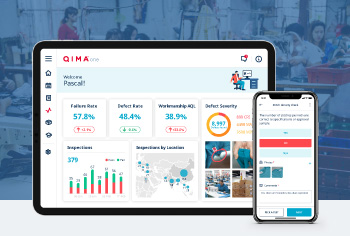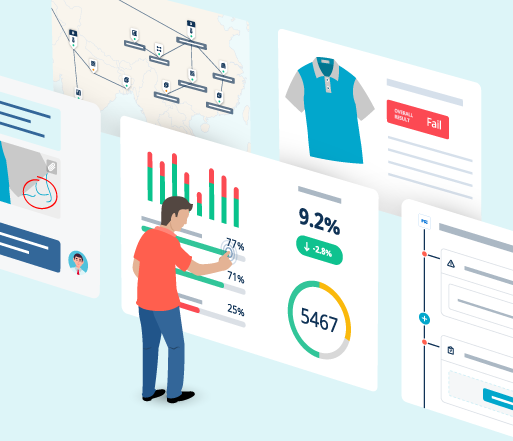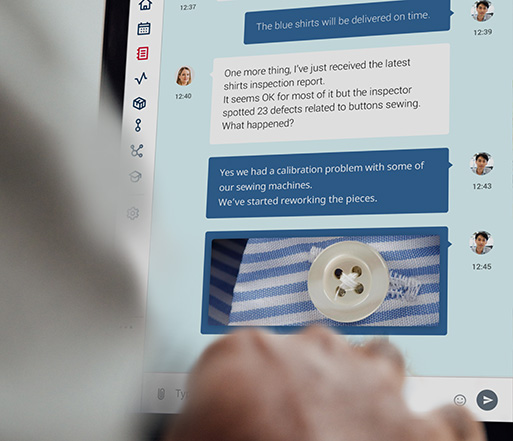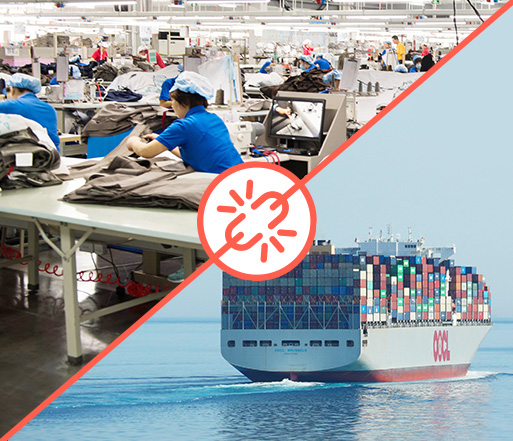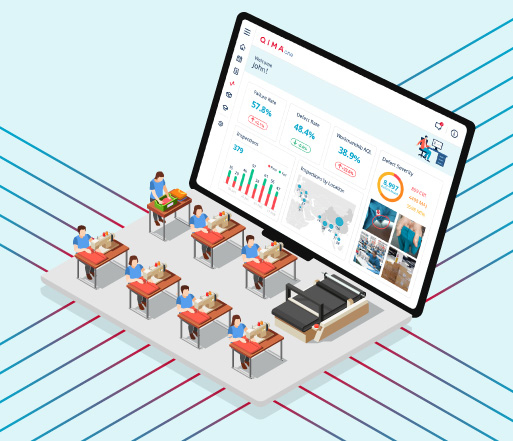
Articles
5 Benefits of Using Supply Chain Quality Control Software

Articles
5 Benefits of Using Supply Chain Quality Control Software
Articles
5 Benefits of Using Supply Chain Quality Control Software

Keep up-to-date with the latest supply chain insights.
Supply chain quality control ensures that products meet certain standards and expectations for safety and customer satisfaction. Through monitoring and managing the entire supply chain—from raw materials to finished products—quality managers that products are produced, transported, and delivered in a consistent and reliable manner.
It’s a demanding job. Fortunately, advances in technology make managing complicated supply chains easier and offer visibility never before possible. Experts agree that companies that invest in software and technology build far more resilient supply chains and enjoy important competitive advantages.
The benefits of quality control software reveal just how important investment in technology can be to businesses. Supply chain quality control software offers a broad range of advantages that help your operations and products stand out in the marketplace and create the ability to respond to shifts in the market environment. In this article, we’ll review 5 of these advantages.
Key Takeaways
Quality control software is useful because it:
- Streamlines quality control processes and standardizes reports
- Automatically schedules inspections
- Provides visibility on suppliers’ performance
- Facilitates data-driven decisions through analyzing quality data
- Simplifies identifying potential risks and quality issues before they occur
Improved Quality Standards
As technological research and consulting group Gartner notes, the key to effective quality management is the presence of processes that are These characteristics are achieved by utilizing robust supply chain quality control software that maintains and improves upon your quality standards.
Supply chain quality control software helps managers maintain quality standards by:
- Standardizing quality control processes: Quality control software aids enterprises in establishing standardized procedures for quality control that ensure consistency across all products or services, identify and address quality issues more quickly, and improve the overall quality of their production.
- Automating quality control tasks: Software automates many of the repetitive and time-consuming tasks associated with quality control—including data entry, inspections, and testing—allowing workers to focus on duties that require human expertise.
- Tracking quality control data: The right quality control technology tracks and analyzes quality control data over time, revealing patterns that may indicate quality issues and providing information that allows for data-driven decision-making to help maintain quality standards.
- Improving collaboration: Quality control software improves collaboration between different departments within a business and across suppliers by providing a centralized platform for data that helps teams share quality information and best practices.
Increased Efficiency and Cost Savings
Businesses can improve supply chain efficiency by leveraging quality control software that manage and track quality issues across a supply chain. These tools are becoming more common as the Internet of Things and Industry 4.0 continue to emerge, and smart companies are using these technological advancements to boost productivity and lower costs.
Supply chain quality control software can help you achieve improved efficiency, including the benefits listed above, through the following features:
- Real-time visibility: The real-time visibility that QC software provides helps businesses identify quality issues as they occur and take immediate actions to address problems. Real-time visibility can also provide supply chain managers with oversight that allows them to understand which suppliers are best to work with.
- Standardization of processes: Businesses standardize processes across their supply chain to ensure that quality control procedures are consistent, repeatable, efficient, and error-free, regardless of the supplier or location.
- Automated data collection: Reducing the need for manual data entry helps reduce errors, improve the accuracy of quality control data, and boost efficiency. With better data collection, supply chain managers can more easily identify areas of their operations leading to waste or lowered productivity.
Enhanced Supplier Management
Supplier management is a critical function of any business that includes relationships between a company and its suppliers. To ensure the delivery of high-quality goods and services, effective supplier management features track performance and facilitate open communication.
As Forrester argues in a recent global events have made the necessity of agile decision-making clearer than ever. The right digital tools make that possible.
Management software is a powerful tool to hedge against supply chain risks. In the face of many global challenges—changing freight costs, environmental conditions, political upheaval, to name a few—the right software helps you remain proactive rather than reactive.
Quality software benefits supplier management by offering improved:
- Supplier selection: Supply chain software helps businesses identify and select the right suppliers for their specific needs based on data that provides insight into criteria such as pricing, quality, reliability, and delivery time.
- Contract management: Businesses can manage contracts and agreements with their suppliers through their software.
- Performance tracking: Quality control software supports enterprises in tracking the performance of their suppliers against pre-defined metrics and provide real-time insights into supplier performance.
- Collaboration: Through the software interface, businesses communicate with suppliers, share information and work together to resolve any issues that arise. Proper collaboration
- Risk management: Through the right software tool, businesses can identify potential risks—such as supplier bankruptcy, non-compliance with regulations, or supply chain disruptions—and take appropriate management measures.
Guide: Choose the best quality
control software for your
business!
Download
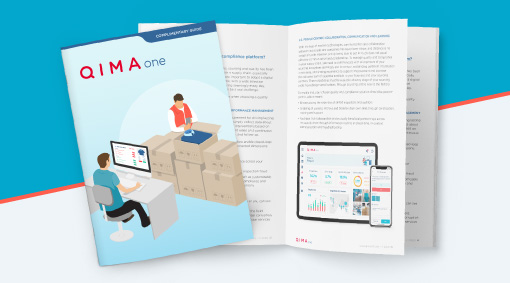
Guide: Choose the best quality
control software for your
business!
Download
Better Visibility and Risk Management
Enhanced visibility and monitoring help managers create supply chains that improve practices and increases profitability. This includes a robust compliance program with regular testing to ensure products are meeting quality and regulatory specifications.
Additionally, quality control software helps supply chain managers reduce supply chain risks by providing a systematic approach to managing quality by triggering preventive and corrective action plans.
Here are some additional benefits that quality control software offers regarding compliance and risk:
- Automate frequently-needed tasks: By providing a platform for managing testing and inspection requirements, quality control software can help businesses automate compliance tasks and generate reports that demonstrate compliance with regulations.
- Real-time, proactive decision-making: Up-to-date monitoring and tracking of the quality of products throughout the supply chain facilitates early decisions to prevent disruptions and defects.
- Manage supplier quality: Businesses can monitor compliance with supplier contracts and specifications, which reduces the risk of quality issues, supply chain disruptions, and unauthorized subcontracting.
Improved Decision Making with Analytics and Reporting
Recent studies show that supply chain managers and other business executives are aware of the need for innovation. However, many companies are still in the initial stages of implementing new technology. By adopting quality control technologies like a collaborative software platform now, businesses can boost their decision-making abilities to get ahead of the competition in the long run.
Quality control software’s analytics and reporting features are critical for businesses to make informed decisions. These features allow businesses to gather, store, analyze and visualize data from quality control processes. Managers can easily create reports that provide insights and recommendations for improving quality control procedures.
Other ways analytics and reporting features allow organizations to:
- Identify trends and patterns: Quality control platforms can create customized reports to help you identify trends and patterns in quality control data and make data-driven decisions to improve quality control processes and prevent future quality issues.
- Monitor Key Performance Indicators (KPIs): Digitized data analysis helps businesses monitor KPIs related to quality control, including defect rates, rejection rates and rework rates. Businesses can then identify areas of improvement, track progress toward quality goals, and make decisions based on accurate metrics.
- Identify High Risk Suppliers: Data analysis triggers action plans like third party quality control and stricter quality control procedures for struggling suppliers.
Closing Thoughts
Supply chain quality control software offers a great number of benefits including improved standards, boosted efficiency, enhanced supplier management, improved compliance, and better decision-making through quality analytics. In a world of modern global supply chains, the application of technology can give companies a valuable edge over competitors who are lagging behind.
Businesses that “aggressively digitize” their supply chain can expect a pre-tax earnings boost of 3.2%. Coupled with the persistent advantages digitization offers over time, the wisdom in such advances seems obvious.
Quality control software is an investment in your organization’s future. When you position your company to optimize supply chain operations and maintain rigorous quality standards, you greatly improve your odds of success in the marketplace.
How QIMA can help
Our QIMAone collaborative software brings our vast experience to the palm of your hands with inspection software that provides industry-leading digital supply chain quality management tools.
Use QIMAone and gain access to thousands of inspectors and auditors from around the globe, each with the world-famous QIMA expertise.
QIMA has the digital knowledge with expertise in CPG and retail TIC. We’ve been a leading global presence in Quality Management since 2005.
With operations in 100 countries, serving more than 30,000 global brands across a wide range of products, QIMA is ready to be your worldwide global Quality Excellence partner.
QIMA also offers services that can help your team get the information it needs to compete in the global marketplace, including inspections, audits, certifications and testing.
If you’d like to schedule a consultation with one of our experts, visit our Contact page today.
Most Popular Articles
Corrective Action Plans 101: Your Basic Guide to Ensuring Supply Chain Quality Excellence
The Benefits of a Data-Driven Supply Chain
6 Benefits of Supply Chain Visibility
How to Implement a Quality Management System
Simpli Home: Ensuring product quality and compliance with supply chain technology
7 Effective Ways to Improve Your Quality Management System
Supply Chain Visibility: Complete Guide for Supply Chain Managers
Boost Quality Control with Supplier Performance Metrics

